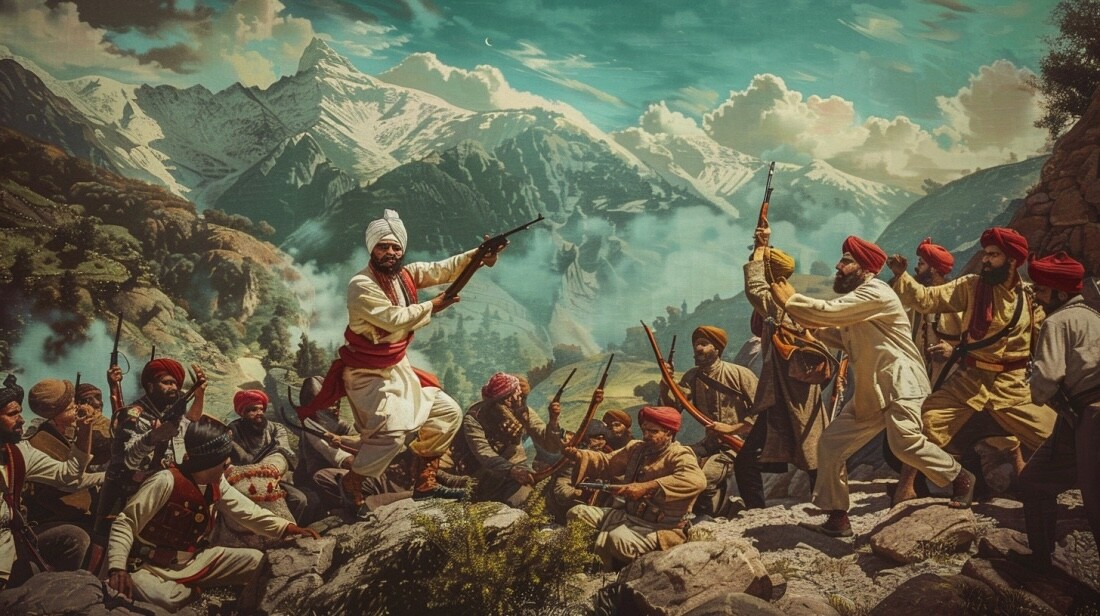
What sparked the Poonch Rebellion? The Poonch Rebellion of 1947 was a significant event in the history of Jammu and Kashmir. It began due to a combination of political, economic, and social factors. High taxes imposed by the Maharaja, economic hardships, and political dissatisfaction among the people of Poonch fueled the unrest. Additionally, the partition of India and the subsequent communal tensions played a crucial role in escalating the situation. The people of Poonch, feeling marginalized and oppressed, rose against the Maharaja's rule, leading to a full-scale rebellion. This uprising eventually contributed to the broader conflict in the region, impacting the future of Jammu and Kashmir.
Key Takeaways:
- The Poonch Rebellion was a major uprising in 1947 in Jammu and Kashmir, fueled by economic grievances and leading to a full-scale war between India and Pakistan.
- The rebellion had a lasting impact, resulting in the division of Poonch, establishment of the Line of Control, and ongoing tensions between India and Pakistan.
The Poonch Rebellion: A Brief Overview
The Poonch Rebellion of 1947 was a significant event in the history of the Indian subcontinent. It played a crucial role in the larger context of the partition of India and the subsequent conflict between India and Pakistan over the region of Jammu and Kashmir. Here are some fascinating facts about this historical uprising.
- The Poonch Rebellion began in the princely state of Jammu and Kashmir in 1947.
- It was primarily a revolt by the Muslim population against the Hindu Maharaja Hari Singh.
- The rebellion was fueled by economic grievances, including high taxes and oppressive policies.
- Poonch had a history of resistance against the Dogra rulers, dating back to the 19th century.
- The region of Poonch was strategically important due to its location near the border with Pakistan.
- The rebellion was part of a larger series of uprisings in the Jammu region during the partition of India.
- The rebels in Poonch were initially led by local leaders and ex-servicemen from the British Indian Army.
- The conflict in Poonch quickly escalated into a full-scale war between India and Pakistan.
- The Poonch Rebellion contributed to the first Indo-Pakistani War of 1947-1948.
- The rebels received support from tribal militias from the North-West Frontier Province of Pakistan.
Key Figures in the Poonch Rebellion
Several key figures played pivotal roles in the Poonch Rebellion. Their leadership and actions significantly influenced the course of the uprising.
- Sardar Ibrahim Khan emerged as a prominent leader of the rebellion.
- Khan later became the first President of Azad Jammu and Kashmir.
- Colonel Akbar Khan, an officer in the Pakistani Army, provided military support to the rebels.
- The Maharaja of Jammu and Kashmir, Hari Singh, struggled to maintain control over the region.
- Sheikh Abdullah, a prominent Kashmiri leader, initially supported the Maharaja but later aligned with India.
The Impact on the Local Population
The Poonch Rebellion had a profound impact on the local population, leading to significant social and economic changes.
- Thousands of people were displaced due to the conflict.
- Many villages in Poonch were destroyed during the fighting.
- The rebellion led to widespread loss of life and property.
- The local economy was severely disrupted, with agriculture and trade coming to a standstill.
- The conflict created deep-seated animosities between different communities in the region.
The Aftermath of the Poonch Rebellion
The aftermath of the Poonch Rebellion had long-lasting consequences for the region and its people.
- The ceasefire agreement of 1949 resulted in the division of Poonch between India and Pakistan.
- The Line of Control (LoC) was established, separating the two parts of Poonch.
- The rebellion and subsequent war led to the creation of the United Nations Military Observer Group in India and Pakistan (UNMOGIP).
- The conflict over Poonch set the stage for future Indo-Pakistani wars.
- The region remains a flashpoint for tensions between India and Pakistan to this day.
Cultural and Historical Significance
The Poonch Rebellion holds significant cultural and historical importance for the people of Jammu and Kashmir.
- The rebellion is remembered as a symbol of resistance against oppressive rule.
- It has been the subject of numerous books, articles, and documentaries.
- The events of 1947 continue to shape the political landscape of Jammu and Kashmir.
- The Poonch Rebellion is commemorated by various organizations and communities in the region.
- The legacy of the rebellion serves as a reminder of the complex history and ongoing struggles in Jammu and Kashmir.
Reflecting on the Poonch Rebellion
The Poonch Rebellion of 1947 stands as a significant chapter in the history of the Indian subcontinent. This uprising, driven by the discontent of the Poonch people, played a crucial role in shaping the region's political landscape. The rebellion highlighted the struggles and aspirations of the local population, who sought justice and autonomy. Understanding these events provides valuable insights into the complexities of the region's history and the enduring impact on its people. The Poonch Rebellion is a testament to the resilience and determination of those who fought for their rights. As we reflect on this period, it's essential to recognize the broader implications and lessons that continue to resonate today. The legacy of the Poonch Rebellion reminds us of the importance of freedom, justice, and the enduring spirit of those who strive for a better future.
Frequently Asked Questions
Was this page helpful?
Our commitment to delivering trustworthy and engaging content is at the heart of what we do. Each fact on our site is contributed by real users like you, bringing a wealth of diverse insights and information. To ensure the highest standards of accuracy and reliability, our dedicated editors meticulously review each submission. This process guarantees that the facts we share are not only fascinating but also credible. Trust in our commitment to quality and authenticity as you explore and learn with us.
